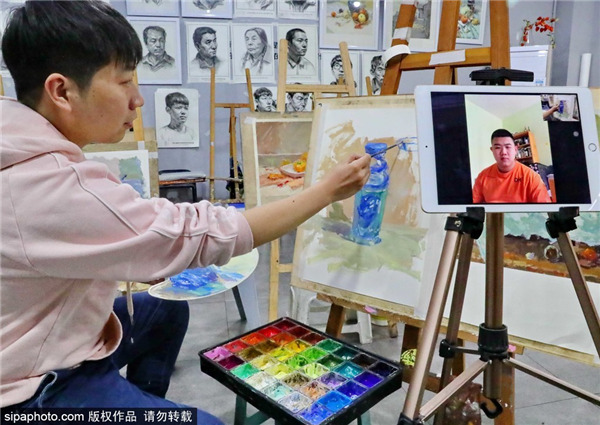Special year for students applying to art majors amid epidemic


If it was not for the outbreak of novel coronavirus, Li Haiyi would have received confirmation letters from some of the Chinese art colleges that he had applied by this time. But right now, he is making video clips on exam assignments given online by the art schools.
China's Ministry of Education issued a notice in March asking the country's colleges and universities to use off-site methods to examine applicants for art majors for their professional skills. The move is to prevent large scale gathering and flow of people amid the novel coronavirus outbreak.
Normally, the art schools arrange independent on-site exams to appraise the examinees' professional potential, before the annual national college entrance exam, known as Gaokao in Chinese.
"I had booked tickets in advance for on-site exams at the schools that I had applied to. But they have changed their admission rules. I won't make the trips. The schools either admit directly with the results of Gaokao scores without having on-site exams or require video works as examination via online platforms," said Li.
He applied to the majors of photography, film and television production and visual communications in a number of art colleges and universities in Beijing as well as Zhejiang and Jiangsu provinces.
He said the changed rules brought more uncertainties to his college dream. "I feel like a rush for the new admission rules. I should prepare myself for the worst and repeating the graduating class in high school for another year," he said.
The prospect of jobs in China's booming film and TV industries has driven students to sign up at art colleges, deemed as cradles for film stars. Prestigious art schools used to have long queues when applicants waited their turn for annual on-site exams.
More than 1.15 million students apply for art majors across the country this year, according to the ministry's statistics.
Communication University of China said it has opened online admissions for 23 majors and directions. The school's expert teams are evaluating video works sent in by candidates online.
The university asked candidates to shoot videos with ordinary smartphones rather than professional equipment to ensure fairness. It forbids makeup and modifying effects for shooting. "Video works should keep the original images and sounds, and no post-production is allowed," it says in the online examination notice.
Yan Leifan, chief of the university's admission office, said the university received more than 21,000 applications this year, a slight increase over last year.
"It is difficult to identify cheating in online exams. This may be a common problem faced by all art schools this year," he said.
The university requires some reexaminations two weeks after Gaokao to compare the results with the online entries in order to check for cheating, he said.
Chen Zhiwen, a member of the expert group of the National Education Examination Committee, said in addition to using technology such as face recognition, education authorities have cooperated with the public security department to carry out strict identity screening for art school applicants. Face recognition is required before online video examinations.




































